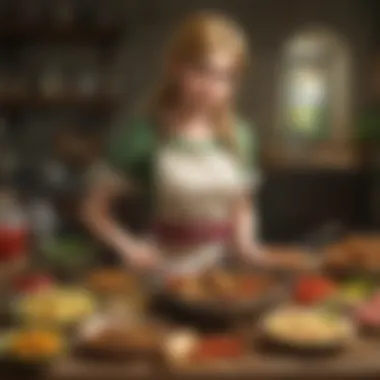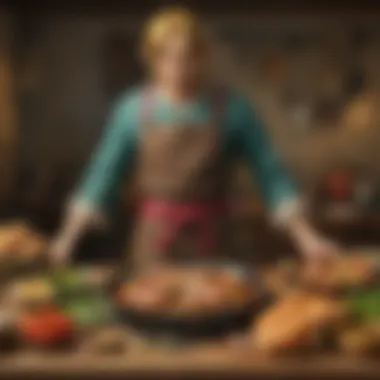Mastering the Art of Cooking Complex Dishes: A Comprehensive Guide


Cooking Techniques for Hard Dishes
Venture into the realm of culinary challenges with our expert guide on conquering the complexities of cooking difficult dishes. From honing intricate methods to handling rare ingredients, this article serves as a meticulous roadmap for elevating your cooking skills to new pinnacles.
Deciphering Complex Techniques
Unlock the secrets of intricate culinary techniques that are imperative for mastering hard dishes. Delve into the precise art of sous vide cooking, molecular gastronomy, and tempering chocolates. Understand the nuances of emulsification and the importance of precise measurements in challenging recipes.
Embracing Exotic Ingredients
Dive into the world of exotic ingredients that add depth and sophistication to your hard dishes. Explore the gastronomic wonders of truffles, saffron, and caviar. Learn the art of integrating exotic spices like sumac, fenugreek, and za'atar to enhance flavors in your culinary creations.
Cooking Accessories for Hard Dishes
Embark on a journey through essential cooking accessories that are indispensable for tackling hard dishes with finesse. From precision kitchen scales to high-quality chef knives, equip yourself with the tools necessary to ace challenging recipes.
Precision Kitchen Scales
Discover the significance of precision kitchen scales in achieving accurate measurements crucial for intricate recipes. Unveil the diverse types of scales available, ranging from digital to analog, and their respective advantages in different culinary applications.
High-Quality Chef Knives
Explore the world of high-quality chef knives and their pivotal role in preparing hard dishes with precision. Understand the anatomy of chef knives, from the blade to the handle, and the importance of proper maintenance for optimal performance in the kitchen.
Conclusion
Synthesize the wealth of information provided in this guide to cooking hard dishes. Empower yourself with advanced culinary techniques and a repertoire of exotic ingredients to embark on a gastronomic journey filled with innovation and mastery.
Understanding the Complexity of Hard Dishes
When delving into the world of culinary arts, the significance of comprehending the complexity of hard dishes cannot be overstated. It serves as the foundation for aspiring chefs to elevate their skills to a professional level. Understanding the intricacies involved in preparing challenging dishes allows enthusiasts to broaden their culinary repertoire and tackle recipes with finesse and confidence. Moreover, mastering difficult dishes opens up a realm of possibilities for culinary experimentation, pushing the boundaries of traditional cooking techniques.
Unraveling the Culinary Mysteries


Diving into Advanced Cooking Techniques
Exploring the realm of advanced cooking techniques is a pivotal aspect of mastering hard dishes. By diving into the nuances of advanced culinary methods, chefs can enhance the flavor profile and presentation of their creations. This section delves into the art of sous vide, molecular gastronomy, and precision cooking, providing insights into how these techniques can revolutionize the cooking experience. The strategic use of advanced techniques not only elevates the dish but also challenges chefs to think innovatively and experiment with unconventional approaches.
Exploring Unconventional Ingredients
The exploration of unconventional ingredients adds a layer of intrigue and complexity to culinary creations. By incorporating rare and exotic components into dishes, chefs can elevate the flavor profile and create unique gastronomic experiences. This subsection delves into the sourcing and utilization of unconventional ingredients, highlighting the importance of quality and authenticity in elevating dishes. While experimenting with unconventional ingredients can be a bold move, it offers chefs the opportunity to showcase their creativity and push the boundaries of traditional culinary norms.
Embracing the Challenge
Developing Patience and Precision
One of the fundamental aspects of mastering hard dishes is developing patience and precision in culinary execution. Cultivating patience allows chefs to follow intricate recipes meticulously, ensuring each step is executed with precision and care. This section emphasizes the importance of honing one's patience and precision in the kitchen, as these qualities are integral to achieving culinary excellence. By fostering a disciplined approach to cooking, chefs can navigate the challenges of complex dishes with confidence and grace.
Overcoming Culinary Roadblocks
In the pursuit of mastering hard dishes, chefs often encounter culinary roadblocks that test their skill and creativity. This subsection addresses common hurdles faced in the kitchen, such as recipe modifications, ingredient substitutions, and unexpected cooking outcomes. By exploring strategies to overcome these obstacles, chefs can adapt to unforeseen circumstances and turn challenges into opportunities for growth. Overcoming culinary roadblocks requires ingenuity and adaptability, traits that are essential for evolving as a skilled and versatile chef.
Mastering the Art of Difficult Dishes
In the vast world of culinary challenges, the significance of mastering the art of difficult dishes cannot be overstated. This section serves as the cornerstone of our comprehensive guide, emphasizing the substantial role it plays in honing one's gastronomic skills to a level of unparalleled sophistication. By delving into various intricate techniques and handling exotic ingredients with finesse, aspiring chefs can elevate their culinary prowess to new heights, transcending mere cooking into an art form. The mastery of difficult dishes requires a profound understanding of not just the recipes but also the cultural and historical contexts that shape them, offering a holistic approach to culinary excellence.
Techniques for Success
Knife Skills Mastery:
Exploring the realm of knife skills mastery unveils a crucial aspect of culinary expertise essential for achieving precision and finesse in preparing hard dishes. Sharpening this proficiency contributes significantly to the overarching goal of mastering the art of difficult dishes. The key characteristic of knife skills mastery lies in its ability to transform seemingly simple ingredients into culinary masterpieces through precise cutting techniques. This meticulous practice, although demanding, proves to be a fundamental and popular choice in enhancing the culinary experience. The unique feature of knife skills mastery lies in its power to elevate even the most basic dishes, adding a touch of elegance and refinement that resonates with the essence of this article on cooking challenging dishes.
Temperature Control Expertise:
The mastery of temperature control expertise emerges as a fundamental element in the pursuit of culinary excellence, particularly when venturing into the realm of hard dishes. Precise control over temperatures not only ensures the optimal cooking of ingredients but also underscores the chef's meticulous attention to detail. The key characteristic of temperature control expertise lies in its ability to transform raw components into harmoniously cooked creations, enhancing flavors and textures to perfection. This approach proves to be a popular choice among seasoned chefs for its capacity to deliver consistent and delectable results. The unique feature of temperature control expertise lies in its delicate balance between science and art, offering culinary enthusiasts a nuanced understanding of the cooking process.
Flavor Balancing Techniques:


Exploring the nuances of flavor balancing techniques uncovers a critical facet of culinary artistry essential for creating memorable dishes that tantalize the taste buds. This section contributes significantly to our discourse on mastering difficult dishes by highlighting the intricate interplay of flavors. The key characteristic of flavor balancing techniques is their ability to harmonize contrasting elements, creating a symphony of tastes that elevate the dining experience. This approach proves to be a popular choice among discerning chefs seeking to achieve gastronomic excellence. The unique feature of flavor balancing techniques lies in their capacity to transform ordinary meals into extraordinary culinary delights, infusing each dish with depth and complexity that resonate with the essence of this article.
Ingredient Exploration
Sourcing Rare and Exotic Ingredients:
Delving into the realm of sourcing rare and exotic ingredients illuminates a crucial aspect of culinary innovation essential for embarking on the journey of cooking hard dishes. The key characteristic of this exploration lies in its ability to introduce unique flavors and textures that elevate dishes to a level of unparalleled sophistication. This approach proves to be a beneficial choice for our article as it emphasizes the importance of authenticity and creativity in culinary endeavors. The unique feature of sourcing rare and exotic ingredients lies in its capacity to inspire culinary experimentation, empowering chefs to push the boundaries of traditional cooking and unlock new dimensions of flavor.
Substitute Strategies for Hard-to-Find Items:
Navigating through substitute strategies for hard-to-find items offers a strategic approach to overcoming culinary challenges associated with rare ingredients. This section plays a vital role in our discussion on ingredient exploration by providing practical solutions for chefs aiming to master difficult dishes. The key characteristic of substitute strategies lies in their adaptability and resourcefulness, enabling chefs to maintain the integrity of recipes while making necessary ingredient substitutions. This approach proves to be a popular choice for its pragmatic and creative solutions to ingredient scarcity. The unique feature of substitute strategies lies in their ability to spark culinary ingenuity, encouraging chefs to think outside the conventional boundaries of cooking and discover innovative ways to enhance their dishes.
Equipment Essentials
Utilizing Specialized Kitchen Tools:
Exploring the use of specialized kitchen tools unveils a crucial aspect of culinary craftsmanship that significantly enhances the cooking experience, especially when tackling hard dishes. The key characteristic of utilizing specialized kitchen tools is their ability to streamline complex cooking processes and improve overall efficiency in the kitchen. This choice proves to be beneficial for our article as it emphasizes the importance of precision and control in culinary endeavors. The unique feature of utilizing specialized kitchen tools lies in their capacity to empower chefs with the means to execute intricate techniques with finesse, contributing to the mastery of difficult dishes.
Optimizing Appliance Performance:
Optimizing appliance performance emerges as a pivotal element in navigating the intricate world of cooking challenging dishes, where precision and reliability are paramount. The key characteristic of optimizing appliance performance lies in its capacity to ensure consistent results and culinary excellence. This choice proves to be popular among chefs aiming for efficiency and accuracy in their cooking endeavors. The unique feature of optimizing appliance performance lies in its ability to revolutionize kitchen operations, enhancing the overall culinary experience and facilitating the mastery of difficult dishes.
Navigating Through Culinary Challenges
In the realm of culinary excellence, navigating through various challenges plays a pivotal role in enhancing one's cooking prowess. This section delves deep into the significance of mastering the art of overcoming common obstacles faced by chefs and home cooks alike. By honing the skills necessary to tackle these challenges head-on, individuals can elevate their culinary creations to new heights of sophistication and flavor complexity.
Overcoming Common Obstacles
Managing Time Constraints:
Efficiently managing time constraints stands out as a crucial aspect in the culinary world. It underscores the importance of meticulous planning and execution to ensure dishes are prepared and served with precision. The key characteristic of managing time constraints lies in its ability to optimize kitchen operations, leading to streamlined workflows and timely meal delivery. While challenging, mastering time management benefits individuals by instilling discipline and refining their organizational skills, ultimately enhancing the culinary outcomes of this article.
Adapting Recipes to Dietary Restrictions:


Adapting recipes to accommodate various dietary restrictions is imperative in creating inclusive and diverse culinary experiences. The core feature of adapting recipes to dietary restrictions revolves around customization, enabling chefs to cater to specific nutritional needs or preferences. This adaptability not only broadens the audience for culinary creations but also fosters creativity in recipe development. However, challenges may arise in balancing flavor profiles or textures when altering recipes, requiring a keen understanding of ingredients and substitutions to maintain taste integrity within the context of this article.
Handling Complex Plating Techniques:
Proficiency in handling complex plating techniques showcases attention to detail and presentation expertise in culinary endeavors. The essence of mastering complex plating techniques lies in transforming dishes into visually appealing works of art, enticing diners through aesthetic allure. The advantage of these techniques lies in elevating the dining experience, enriching not only the taste but also the visual enjoyment of a meal. Nonetheless, intricate plating methods demand practice and precision, as missteps can detract from the overall dining experience depicted throughout this article.
Seeking Inspiration
Embarking on a journey to seek inspiration is a fundamental element in honing culinary skills and creativity. This section highlights the importance of drawing ideas from diverse culinary traditions and innovative sources to enrich one's cooking repertoire. By exploring the vast landscape of world cuisines and learning from accomplished chefs, individuals can infuse their dishes with unique flavors and inventive flair, transcending culinary boundaries and pushing the boundaries of gastronomic exploration.
Exploring World Cuisines for Ideas:
Exploring different world cuisines serves as a wellspring of inspiration for aspiring chefs and seasoned cooks alike. The pivotal characteristic of this endeavor lies in exposing individuals to a multitude of flavors, ingredients, and cooking styles from across the globe. This exposure fosters cross-cultural appreciation and creativity in recipe development. While beneficial in expanding culinary horizons, exploring world cuisines requires a discerning palate and open-mindedness to embrace new gastronomic experiences portrayed in the context of this article.
Drawing Creativity from Master Chefs:
Drawing creativity from master chefs empowers individuals to glean insights and innovative techniques from culinary luminaries. Such engagement brings forth a wealth of culinary knowledge and artistic vision, encouraging experimentation and refinement in one's culinary pursuits. The distinctive feature of this practice lies in its ability to mentor and inspire, nurturing the creative spark within each individual. However, the emulation of master chefs demands respect for originality and adaptation, ensuring a balance between guidance and personal culinary expression in alignment with the narrative of this article.
Enhancing Culinary Skills and Knowledge
In this section of the article, we delve into the significance of enhancing culinary skills and knowledge. To navigate the complexities of cooking hard dishes, one must prioritize continuous learning and improvement. Embracing the art of culinary mastery requires a deep understanding of techniques, ingredients, and equipment. By honing one's culinary skills, individuals can elevate their cooking prowess to new heights, tackling even the most challenging recipes with finesse and precision.
Continuous Learning and Improvement
Enrolling in Advanced Cooking Classes
Delving into the realm of advanced cooking classes is a pivotal step in refining culinary expertise. These classes offer a structured environment for dedicated learners to enhance their skills under the guidance of seasoned professionals. The key characteristic of enrolling in advanced cooking classes lies in the specialized curriculum that delves into intricate culinary techniques beyond the basics. This focused approach caters to individuals looking to expand their repertoire and master advanced skills essential for tackling hard dishes. The unique feature of these classes is the hands-on experience and personalized feedback, allowing students to refine their techniques and culinary judgment. While enrolling in advanced cooking classes can be a significant investment in time and resources, the advantages are manifold, offering a tailored learning experience that accelerates culinary growth within the context of this article.
Experimenting with Fusion Cuisine
Experimenting with fusion cuisine adds a creative dimension to the exploration of hard dishes. By blending flavors, techniques, and ingredients from diverse culinary traditions, chefs can create innovative and exciting dishes that push the boundaries of traditional cooking. The key characteristic of experimenting with fusion cuisine is the fusion of culinary elements to create unique and harmonious flavor profiles that captivate the palate. This experimental approach is beneficial for this article as it encourages chefs to think outside the box and cultivate a more dynamic culinary perspective. The unique feature of fusion cuisine lies in its versatility and ability to inspire new culinary creations. While experimentation with fusion cuisine may pose some challenges in terms of flavor balance and cultural authenticity, the potential for culinary innovation and discovery far outweighs any drawbacks, making it a valuable pursuit in the realm of hard dish preparation.
Sharing Experiences and Expertise
Collaborating with Culinary Enthusiasts
Collaborating with culinary enthusiasts offers a collaborative platform for knowledge exchange and skill development. The key characteristic of collaboration in this context is the synergy of ideas and perspectives that arise when passionate individuals come together to share their culinary experiences. This symbiotic relationship fosters creativity and fosters a sense of community within the culinary sphere. The unique feature of collaborating with culinary enthusiasts is the opportunity to gain fresh insights and inspiration from a diverse group of like-minded individuals. While collaboration may require compromise and coordination, the advantages of pooling resources and expertise for mutual growth and learning are evident, making it a valuable choice for this article.
Mentoring Aspiring Cooks
Mentoring aspiring cooks involves imparting knowledge, encouragement, and guidance to individuals eager to pursue a culinary path. The key characteristic of mentoring lies in the mentor's role as a seasoned expert offering support, feedback, and direction to those navigating the culinary world. Mentoring provides aspiring cooks with a roadmap for skill development and career advancement, fostering a nurturing environment for growth and learning. The unique feature of mentoring is the personal connection and mentorship dynamic that allows for tailored advice and mentorship. While mentoring requires time and commitment from both parties, the benefits of mentorship, such as accelerated learning, networking opportunities, and personal development, make it a worthwhile endeavor in the context of this article.







